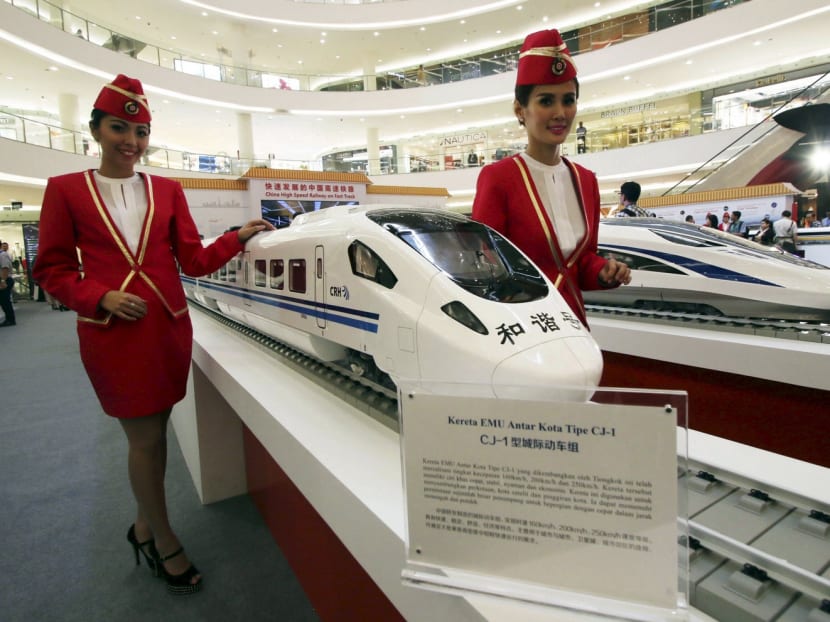Tax, land issues deter Chinese investment in Indonesia
MANADO — At last month’s showcase Belt and Road summit in Beijing, Indonesian President Joko Widodo sidled up to Mr Xi Jinping, his Chinese counterpart, and urged him to send more Chinese companies his way.

Models of high-speed trains at the China High Speed Railway on Fast Track exhibition in Jakarta, Indonesia. Indonesia is a target for Chinese President Xi Jinping’s Belt and Road investment initiative. Photo: Reuters
MANADO — At last month’s showcase Belt and Road summit in Beijing, Indonesian President Joko Widodo sidled up to Mr Xi Jinping, his Chinese counterpart, and urged him to send more Chinese companies his way.
Envious of the billions of dollars of investment promised to South-east Asian neighbours Malaysia and the Philippines, Mr Widodo hopes Chinese money can help deliver his ambitious economic growth plans before he faces re-election in 2019.
But Chinese companies are worried about the difficulties of doing business in the boisterous and decentralised democracy. Problems range from acquiring land and navigating confusing policies to dealing with rising anti-Chinese sentiment.
Speaking at a recent Chinese investment forum in Manado on the Indonesian island of Sulawesi, Ms Zhao Baige, a senior Chinese diplomat, called on Jakarta to give Chinese companies more support, for example by offering tax incentives or helping with public relations.
“We need to understand the policy and law relating to labour, tax and especially land,” she said. “Chinese companies really want details. If there’s no land, there’s no business.”
Indonesia is a target for Mr Xi’s signature Belt and Road investment initiative, which he unveiled in a speech to the Indonesian Parliament in 2013, when the strategy was branded the Maritime Silk Road.
Mr Widodo told Mr Xi at last month’s summit that North Sulawesi, a mere four-hour flight from southern China, was one of three provinces where Chinese investment should be focused, according to Mr Thomas Lembong, head of Indonesia’s investment co-ordinating board.
But despite strong financial and political backing from Beijing and enthusiasm about Indonesia’s potential, Chinese investors are worried about their ability to deliver.
“There are many permit and land-acquisition problems,” said Mr Zou Hongxia, a project co-ordinator for China Road and Bridge Corporation, a state-owned construction group planning to build an industrial zone at the port of Bitung, near Manado.
Large infrastructure projects require multiple approvals from local and national government departments, which are often in conflict in a heavily decentralised nation.
China’s plans to build a US$5.5 billion (S$7.6 billion) high-speed railway between Jakarta and Bandung are on hold because of delays acquiring land, which is a much more difficult process in democratic Indonesia than in authoritarian China.
Mr Lembong wants to promote tourism to Chinese investors because hotels and restaurants can be developed more rapidly than railways and power stations, with a quicker pay-off in terms of economic growth, job creation and foreign currency reserves.
Chinese tourists started flocking to Manado in the past year because of its proximity to China, the launch of direct charter flights and the beautiful beaches and teeming coral reefs of nearby Bunaken Island.
“It’s been great for business and now about 40 per cent of my guests are Chinese,” said Mr Martinus Wawanda, who manages two dive resorts in North Sulawesi.
Mr Trent Huang, a Chinese businessman who launched a mobile phone distributor in North Sulawesi and is considering tourism investments, said Manado has the potential for a “gold rush”. “You can buy a marvellous villa here for just RMB 500,000 (S$101,605), which doesn’t even buy you a bathroom back home,” he said.
Mr Huang said Chinese companies feel welcomed in North Sulawesi, where the majority of the population is Christian, pork is freely available and there is a sizeable ethnic Chinese community, including the head of the provincial Parliament.
But he added that investors looking elsewhere in Indonesia are worried about anti-Chinese sentiment, which has been rising since the ethnic Chinese governor of Jakarta lost a bitterly fought and racially tinged election campaign in the capital of the world’s most populous Muslim-majority nation.
That led to the spread of a series of wild rumours about Indonesia being invaded by millions of Chinese workers and undermined by Chinese plots to poison the food supply.
To defuse domestic sensitivities, the Manado event — pitched to Chinese companies as an “Indonesia-China Investment Co-operation conference” — was promoted locally as an “International Conference on Tourism Investment”.
A senior Indonesian official said the government has to be careful how it manages Chinese investment but that it cannot afford to miss out, especially given that economic growth has remained sluggish at 5 per cent a year (despite Mr Widodo’s promises to boost it to 6 or 7 per cent).
However, he called on Chinese companies to do more to win over the Indonesian public and resolve their own issues with local and national government departments.
“They can’t keep asking us to solve everything,” he said. “They need their own consultants to advise them, just like large European and American companies.” FINANCIAL TIMES






